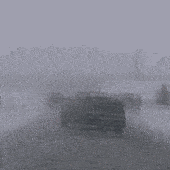|
I am pretty okay with death, and a good few years ago I had a long talk with a counselor that ended with the realization that hospice/bereavement counseling might be something I should be doing with my life. I'm from a rural town in Appalachia, where people tend to really open up when they're facing loss, and in all my time with people who are grieving or who are facing the end themselves, I have never thought twice about how I feel about making a life of those talks. So, after going to school and receiving a BA in philosophy (with focus on individual responses to death and dying), I almost started a Masters' in Social Work. A week before deadline, however, I dropped and dodged the DSS burn-out and Barista bullet most of my classmates took. I scored a decent job in Healthcare IT instead, and, while I've paid off my undergrad loans, I've been getting the feeling it's about time to start living up to my potential here, and hopefully you can help. It's been another evening at my desk with a bunch of textbooks in my Amazon cart, flipping through the ADEC CT cert requirements, knowing I want to keep doing good for people who struggle to deal. I meet a good chunk of requirements for the base cert, except the years of experience in the field, which, as far as I understand/can find (which isn't much), you need a Masters' or a cert to get into... I would prefer to avoid student debt to get a Masters' that won't really pay for itself in the end. Chaplaincy is not my thing, nor is clinical psych -- my focus is pretty specific to death. And I will say if there's any sort of established curriculum, I'm okay with pursuing a pure independent study (even if I don't wind up with any diploma to show for it) to better listen to the people I do come across when it does happen. So, if anyone has any thoughts, experience with hospice counseling themselves (receiving or giving, paid or volunteer/internship), is involved in the academic study of thanatology, has any scholarship/grant/fellowship suggestions to get a masters' (I'm terrible at finding those), or any study advice or book recommendations, lay 'em on me. And even if you wanna stay out of the advice column, feel free to just share stories/experiences -- I dig the listen. (Your thoughts would definitely be super appreciated though, so, y'know, please.) Thanks and I love you -Me.
|
|
|
|

|
| # ? May 3, 2024 20:50 |
|
Each death is a little different and everyone is different so broadly you'll just have to listen carefully as to what their problems/feelings exactly are.s0urc3 posted:And even if you wanna stay out of the advice column, feel free to just share stories/experiences -- I dig the listen. Couple of videos I'd recommend: https://www.youtube.com/watch?v=PPx-qpos57g https://www.youtube.com/watch?v=IaMnRrrQx48
|
|
|
|
My advice, find yourself a shrink, post-haste. That is not a job that is going to lend itself to a healthy state of mind.
|
|
|
|
Why not become an end-of-life doula and see whether or not counselling people through this transition is the right thing for you. Hospices and other end-of-life care organizations employ them sometimes, but often they're just like birth/postpartum doulas in that they work for themselves. It's a low barrier of entry as far as cost and training is concerned, which means you can effectively test-drive the work without pouring a bunch of cash into a Master's. Once you've been working for awhile, you'll have a good feel for (and have made lots of contacts with) who's working with the dying and in what capacity, and you may have a better idea of the right approach for you. Or you might love being an end-of-life doula and do it for years and years - I have a friend who's been working in that capacity in a hospice for the last five and loves it, strange as that may sound. If what you want is specifically to do counselling, rather than just be with the dying in a supportive role, then yes, you need to look at options that will qualify you as a counsellor. thrakkorzog posted:My advice, find yourself a shrink, post-haste. That is not a job that is going to lend itself to a healthy state of mind. This is not a good response. You know who works with dying people all the time? Oncologists. Nobody tells someone who wants to specialize in cancer that they need to find a shrink. Sometimes finding meaningful work means working with the extremes of human existence. Some people can handle that perfectly well, as long as they practice good self-care. If you can't, well, it's good that it's not your job, but that doesn't mean nobody can. Edit: Here is a link to some resources and programs for end-of-life work. Some are pretty sketchy-seeming. Others, like Ryerson University and Western University, are legitimate bodies. This is all Canadian info because I'm Canadian, but I'm sure the American equivalents are easy to find if you are American. Dogfish fucked around with this message at 22:38 on Jul 5, 2016 |
|
|
|
Dogfish posted:Why not become an end-of-life doula and see whether or not counselling people through this transition is the right thing for you. Hospices and other end-of-life care organizations employ them sometimes, but often they're just like birth/postpartum doulas in that they work for themselves. It's a low barrier of entry as far as cost and training is concerned, which means you can effectively test-drive the work without pouring a bunch of cash into a Master's. Once you've been working for awhile, you'll have a good feel for (and have made lots of contacts with) who's working with the dying and in what capacity, and you may have a better idea of the right approach for you. Or you might love being an end-of-life doula and do it for years and years - I have a friend who's been working in that capacity in a hospice for the last five and loves it, strange as that may sound. Actually, I think Oncologists should go see see shrinks as well. I wasn't trying to be flippant, I genuinely think that anybody that has to deal with death as a regular part of their job should seek out out some sort of therapy. It's not a moral judgement. I just think that anybody who spends all their time around dying people would be better off having someone to talk to. And Psychiatrists are trained to handle such discussions. thrakkorzog fucked around with this message at 03:44 on Jul 6, 2016 |
|
|
|
You wouldn't just be dealing with the dying, you'd be dealing with family of the dying, who are likely to be volatile and/or fragile. Not easy stuff. Are you attracted to the idea of it because of what you've seen in movies and TV shows? The real thing is mostly undignified, scary and gross. Also, pretty okay with death sounds like made it through reading Game of Thrones, not actual personal loss. Anyway, if you want to work closely with people in bad situations, the obstacles to being a care worker are a lot lower. Do some volunteer work in a seniors centre for awhile first, maybe. Acute Long-Term Care wards in the hospital would also be relevant.
|
|
|
|
Zogo posted:Each death is a little different and everyone is different so broadly you'll just have to listen carefully as to what their problems/feelings exactly are. Thank you for sharing these! Dogfish posted:Why not become an end-of-life doula and see whether or not counselling people through this transition is the right thing for you. Much as I've spoken with a variety of people, some regions just don't have stuff like this, some people just don't know anyone who does it, and some people can only suggest the paths they took. I appreciate the suggestion. Found a reflection here from the perspective of an end-of-life Doula, but I'd definitely like to look more into this. If your friend wouldn't mind, a reflection on his/her day-to-day and any thoughts she/he has on the topic as a whole would be great to see. Dogfish posted:This is all Canadian info because I'm Canadian, but I'm sure the American equivalents are easy to find if you are American. Luckily, even though the link is in Canadian, it's pretty easy to translate to American. Should helps give plenty of life for some Googling from here. Thanks again  . .thrakkorzog posted:I genuinely think that anybody that has to deal with death as a regular part of their job should seek out out some sort of therapy. Agreed. I think most people should seek out some sort of therapy. But that's another thread, I think. Pixelante posted:Are you attracted to the idea of it because of what you've seen in movies and TV shows? Practicing grief was a substantial part of my upbringing, and my family has been through a lot. Loss in pretty much every form (but especially death) comes with fear and uncertainty, but when it comes, I just kind of get open and listen-y. I'm not really a stoic person, but I am far more contemplative than I am emotionally driven. That's been extremely useful in the past, and has been a fulfilling skill to apply. Pixelante posted:pretty okay with death sounds like made it through reading Game of Thrones, not actual personal loss. Nah, it was understatement, but this thread is more about general possibilities than my history. Pixelante posted:Do some volunteer work in a seniors centre for awhile first, maybe. Acute Long-Term Care wards in the hospital would also be relevant. That's kinda what I was thinking as well. Do you have any experience with this yourself or anything that you experienced while doing it that leads you to suggest this approach in particular? E: cleanup. s0urc3 fucked around with this message at 21:56 on Jul 6, 2016 |
|
|
|
s0urc3 posted:That's kinda what I was thinking as well. Do you have any experience with this yourself or anything that you experienced while doing it that leads you to suggest this approach in particular? I volunteered in an ALC ward. People die there, usually alone. Not a lot of visitors. Most of them are pretty banged up by illness long before they land in that ward--amputated limbs, blindness, confusion. A little comfort goes a long way, but it's hard to shake off when you're done for the day. Not sure what equivalent the US has. I was in Ontario at the time. Private seniors homes are similarly under-staffed for things like chatting, games, and snacks. Services get stripped back the essentials, which makes it hard for paid staff to do any of the humanizing stuff you likely care about. (It's what I cared about.) Another place to volunteer as a trial run would be any Alzheimer's Association equivalent. If you do outreach with them, it's effectively supporting the grieving process. I couldn't hack it, at the end of the day. Needed to deal with my own poo poo first. I do disability advocacy these days, after homelessness/addictions, and that's a lot of grief too. Not all bereavements are literal death. I find disability work less wearying, though. You get more wins among the losses.
|
|
|
|
Pixelante posted:I volunteered in an ALC ward. People die there, usually alone. Not a lot of visitors. Most of them are pretty banged up by illness long before they land in that ward--amputated limbs, blindness, confusion. A little comfort goes a long way, but it's hard to shake off when you're done for the day. I think I'll try calling up the local home health service and see if I can get the names of a long term care center or two that would be open to volunteers. I've done plenty of study, and some applied talking here and there (how I'm interested in the first place), but never really just went in to build a repeat rapport relationship with a stranger who could use the company. Also, Pixelante posted:Not all bereavements are literal death. Great way to put that. A large part of what-I'm-good-with is death specifically, but I'll definitely get to know some of the workers and see if they have any suggestions. Really appreciate the feedback.
|
|
|
|
thrakkorzog posted:Actually, I think Oncologists should go see see shrinks as well. Well in that case I agree with you. Sorry; I initially read your response as "Anyone who wants to work with the dying is nuts!" I agree 100% that anyone who is at risk of burnout and/or compassion fatigue because their work is very emotionally demanding should for sure do at least occasional counselling as part of self-care. s0urc3 posted:Much as I've spoken with a variety of people, some regions just don't have stuff like this, some people just don't know anyone who does it, and some people can only suggest the paths they took. I appreciate the suggestion. Found a reflection here from the perspective of an end-of-life Doula, but I'd definitely like to look more into this. If your friend wouldn't mind, a reflection on his/her day-to-day and any thoughts she/he has on the topic as a whole would be great to see. I'll ask my pal if he has anything written down. I feel like he used to have a blog for awhile. If you're looking for specific resources on end-of-life doula work you could check out INELDA or another one of the associations (I think INELDA is in fact American so no translation required  ) which have some good resources not only in terms of training but also in terms of finding folks in your area doing this kind of work. ) which have some good resources not only in terms of training but also in terms of finding folks in your area doing this kind of work.
|
|
|
|
I'm an ICU nurse and deal with death, often unexpected and traumatic, all the time. Have you thought about nursing? There are lots of different ways to be involved in hospice as a nurse. Inpatient hospice, home care, palliative care, case management, hospice houses, etc. If you already have a bachelors degree, you could go the accelerated route and be done in a couple years. Social workers don't do much hands on care for hospice compared to nursing staff. If you're really wanting to be involved with a hospice patient's care and be the one who is there, developing rapport, trust, and personal connections with people and their families, nursing is the way to go. Counseling requires a degree or certification. I'm not sure how involved a counselor gets for outpatient hospice apart from office or home visit appointments, but there is certainly not as much time spent 1:1 with the patient and family compared to a nurse. As far as dealing with it as a care provider, it's not easy bit it does get easier with time. You've definitely got to have good stress management figured out and a good support system of family, friends, and especially coworkers, as they will be able to empathize more when an experience is tough. You've also got to take time away every once in a while. Even if you can't feel it, going through tragic experiences every day can take a toll. I've cared for hundreds of low-acuity people who have gotten better and carried on with life, and I don't remember them, but I do remember cases that have been particularly sad or traumatic, and will likely remember them for a long time.
|
|
|
|
Koivunen posted:Have you thought about nursing? I grew up in and around hospitals and have worked at one for a good couple years, so I have had some decent exposure to day-to-day nursing and I recognize there's elements of the physical care of a patient that I just am not wired for. While the complete basics like CPR and First Aid because-I'm-the-only-one-around are one thing, my current degree, skills, and passions are much more specific to the mental and social realms. If I were to buck the "no student loans" thing and spend money to move toward further education/certification, it would be in psychological counseling or even pure thanatological study. (ICU nurses I've known are super incredible people and I've loved all the ones I've worked with, thank you for what you do.) Dogfish posted:I'll ask my pal if he has anything written down. I feel like he used to have a blog for awhile. If you're looking for specific resources on end-of-life doula work you could check out INELDA or another one of the associations (I think INELDA is in fact American so no translation required That would be awesome, and thanks for the link! I'll poke around there a while and see if I can find out the current status on whether anything like this exists at local hospitals, maybe I can catch someone in person.
|
|
|
|
Don't rule out grad school, keeping in mind that they should be paying you to attend (not vice versa). If you can't get accepted to a program that will pay you a stipend in exchange for research or TA duties, though, then pass.
|
|
|
|
I'm not sure where you are in life. If you're up for it, find a palliative care physician at a local hospital and ask for shadowing opportunities. You might get turned down due to the sensitive nature of the work, but any experience is good experience. I'm hoping the poster above who said to see a shrink wasn't just being a dick, but I agree. This kind of work is very difficult psychologically and you're doing both yourself and your patients/clients a disservice if you don't make every effort to keep yourself mentally healthy. This is a big part of what I do and want to do for a living. Feel free to reach out.
|
|
|
|
Take some classes in your local university's sociology program, specifically regarding "Death and Dying" and "Elder Care". My mother just retired a couple of years ago from teaching sociology. Her primary focus was end-of-life care. What's important is to make sure that everyone understands that death is a part of living and that the dying get to make the call on how they should be treated. If someone is dying, it is their choice as to how they go out. If they want to use extraordinary measures, support them. If they want a DNR, support them. Pain management is important. Hospice is important. The hospice nurses were wonderful to my Grandmother. She died 5 days after her 100th birthday party. The nurses came to the house and checked on her daily and kept her alive and moving until the birthday. She wanted to see 100 before she passed. Her health really started to fail about 5 months before she died. That's when we started hospice care. My mother and the nurses explained to her, straight-up, that she was in the process of dying. Once she understood that she wouldn't get better, she was fine with it. Always be honest and open. Always treat the dead and dying as if it was any other day. They're dying, they're not stupid. You owe them that. Once you start to go numb and don't feel bad anymore, quit your job. You have to be able to feel loss.
|
|
|
|
If you want to do actual counseling of any kind you'll need to be licensed for it, and there are only so many paths you can take for that. Geriatric social work is absolutely something that can be specialized in, and in fact there's a serious nationwide shortage of geriatric social workers (as well as geriatricians and palliative care specialists in general). It's an underserved population.
|
|
|
|
Mechafunkzilla posted:If you want to do actual counseling of any kind you'll need to be licensed for it, and there are only so many paths you can take for that. Geriatric social work is absolutely something that can be specialized in, and in fact there's a serious nationwide shortage of geriatric social workers (as well as geriatricians and palliative care specialists in general). It's an underserved population. My dad is a medical social worker at a hospital. He is not a therapist, as he only has a bachelors in social work. He works with a lot of end of life issues, but sadly, it is more about finding resources - counseling, hospice, relatives, money - rather than being a resource. And having your head on straight is critical. My dad says that a bad day is when he puts someone his age in hospice. A worse day is when he puts someone half his age in hospice. My mom says he comes home on Friday and stares into space until Saturday morning. I am glad he will be retiring soon.
|
|
|
|
I would suggest getting as much hands on as you can before committing to it. I used to work in the disability field where I fixed wheelchairs and the like. I had many clients both elderly and children who were terminal. I saw many people start out in the industry and quickly leave when they found out that they were not okay with death. Something to consider, while the death may fascinate you, there are thing's that go with it that you may not be ready for. Personally, I had no problem with the death itself and generally, the people on death's door were ok with it, they were just more often than not, lonely more than anything else. The strangest thing to me was how life just went on as usual in the face of impending doom. I would come to someone's house who was expected to not make it through the year and they would be watching Jerry Springer. I had a terminal kid's wish to meet Jon Cena come true and he couldn't stop talking about it while he's in his hospital bed hooked up to three different IVs. Things like that made me more depressed than the dying itself. A previous poster mentioned the family being the hardest to deal with and he's right. There is no one that can make you more depressed than the parents of a child who was born with a terminal disease that left him crippled and underdeveloped but still lived twice as long as the doctor's estimated, giving them a false sense of hope, but also an understanding that every day could be his last.
|
|
|
|

|
| # ? May 3, 2024 20:50 |
|
I do a range of work in the educational/counseling psychology world. While I'm currently mostly research based, I do occasionally work in a clinical setting with populations close to death, and have colleagues that work with Hospice and Death with Dignity/Right to Die. Feel free to ask me any questions and I can try and I can try to answer them myself or ask others and report back. One thing I will emphasize is the extreme importance of supervision. Supervision is a special term in counseling/social work settings, and it basically means you have access to a relationship with a colleague you feel comfortable and legally can discuss your feelings and experiences with clients. It's like having a therapist, sort of, but it is usually someone at the same agency who has more experience than you and you feel comfortable with. These discussions, often called a 'debrief' is how you process 'vicarious trauma' and avoid things like PTSD and burnout, it is essential for professionals to volunteers. Here is a great read: http://www.indianapolismonthly.com/longform/susan-cox-is-no-longer-here/
|
|
|















